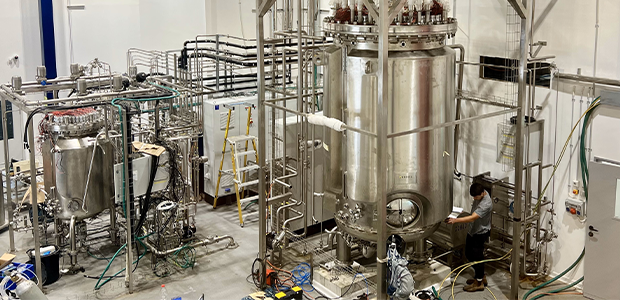
Brevel implements first-of-a-kind model for its microalgae protein
Microalgae protein innovator Brevel has successfully implemented the FOAK (First-Of-A-Kind) strategy method by building its first plant for proprietary industrial-scale fermenters for microalgae protein. The company has completed construction of its FOAK facility and already secured two commercial agreements with leading food & beverage companies.
A FOAK facility is a production line or factory that showcases new technology at commercial scale for the first time. This provides confidence to investors, customers, and partners that the technology is viable in real-world applications, effectively minimising technology risk. Once such validation is achieved, the focus shifts to operational and market challenges, significantly reducing overall risk.
In its latest “Funding The Build” report, The Good Food Institute (GFI) shed light on the financing landscape for growing the alternative protein sector. The guide zeros in on a key bottleneck – financing for scaling alt protein manufacturing – and suggests strategic solutions to overcome these challenges.
GFI reported that the institute identified certain strategies for this mission. For example, protein-centred product makers can engage in co-manufacturing with protein or dairy companies. Other alt-protein companies that prefer to build their own facilities could be eligible to source funding from select US government programs and sovereign wealth funds. Another strategy would be forming strategic partnerships with large agricultural or food corporations.
"Our report makes clear that companies have options, but these options are not enough. Collaboration, sustained effort, ingenuity, and patience are needed to unlock additional financing pathways. Together, governments, foundations, strategic companies, and investors can catalyse the funding the industry needs to realise alternative proteins’ transformative potential," says Sharyn Murray, GFI's Senior Manager, Investor Engagement and Financing.
Brevel already achieved a few key milestones in building its FOAK:
- Moving from pilot plant to a new, advanced, fully equipped facility ready-to-go commercial in early 2025
- Brevel has partnering agreements with two types of entities: Off-takers – that is, customers (typically food manufacturers) who want to use Brevel’s proteins in their products, and manufacturing partners interested in joint ventures to build and operate a manufacturing facility to produce protein as an ingredient
The startup is currently working with additional commercial partners to secure and create a pool of contracts, building confidence with partners as well as investors and ensure that the results of the next production lines will be fully commercialised. Such agreements can be used to raise debt and provide confidence to manufacturing partners.
Brevel also is working with partners toward building much larger production lines, and its FOAK facility will serve as a confidence point for these partners who will undertake the financing and operating of these next facilities. According to an article in the startup news and analysis newsletter Sifted, once a company establishes offtakes it’s a sign that the startup is providing something the industry needs. This, in turn, ultimately helps convince investors to join in.
“Foodtech companies innovate the protein space,” explains Yonatan Golan, Brevel’s CEO and Co-Founder, along with his two brothers Ido and Matan. “Plant-based burgers made a great impact in the market several years ago, bringing plant-based into the mainstream. Now is the time for the next phase of plant-based 2.0 which will be better-for you, more nutritious and affordable for the consumers. Brevel’s proprietary technology and know-how enable us to create a chlorella-based protein that delivers a full amino-acid profile, highly functional product and at cost parity. It also has a neutral flavor and color, is highly sustainable, and leaves a minimal environmental footprint.”
Brevel cultivates its microalgae in indoor bioreactors via the fermentation of sugars. Unique to its technology is the simultaneous application of light and fermentation. This enables the generation of nutrient-rich microalgae in abundant yields, without any form of gene modification.
Brevel's FOAK facility has been intentionally designed with a lean structure – just enough to demonstrate a full-scale commercial system. By creating and building both its own fermenters and factory, Brevel kept capital expenditures significantly lower than traditional industry benchmarks. The systems are currently undergoing test runs and scheduled to become fully operational in early 2025, marking a watershed moment for Brevel.
For more startup news, check out the other articles on the website, and subscribe to the magazine for free. Listen to The Cereal Entrepreneur podcast for more interviews with entrepreneurs and big-hitters in the startup ecosystem.

